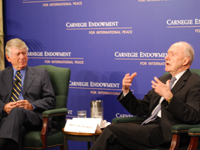Registration
Thank you!
You will receive an email confirming your registration.
Twenty years after Tiananmen Square, the Chinese Communist Party (CCP) retains complete control of China's political and economic apparatus. Its ability to hold on to power, despite many predictions to the contrary, is largely due to reforms instituted after Tiananmen to prevent social instability at all costs. But there will be another Tiananmen if China does not further reform politically, according to panelists including Ted Koppel, Brent Scowcroft, Ambassador J. Stapleton Roy, Even Medeiros, and Minxin Pei.
Jessica Mathews and Douglas Paal moderated the discussion.
Political Change
- Tiananmen led the CCP to evaluate policy decisions based on their effects on social stability. This imperative has led to agreement within the party that change must be gradual.
- After Tiananmen, the CCP became a more technocratic, competent, and capitalist-minded party. In the 1980s, rural peasants constituted 80 percent of the party; today 70 percent of its members are university-educated elites. The Politburo had no university graduates 25 years ago, while today there are only university graduates in the group.
- Compared to twenty years ago, China today allows its citizens significant personal freedom. Long gone, for example, are the CCP campaigns against "yellow music", "pornography", and Western movies. This personal freedom does not extend to politics: citizens forbidden from challenging the Communist Party’s rule.
Looking to the Future
- The Communist Party faces many challenges, including economic overcapacity, great inequality, and pressure to create jobs for migrants.
- The CCP will likely allow more debate in society over policy direction and decisions, although democracy will remain a forbidden subject. Democracy is an active topic in the CCP’s internal debates, however.
- The CCP will have to implement political reform to overcome future obstacles to growth and avoid another Tiananmen. Though China’s leaders know this, the CCP resists reform for fear that change could rip the party apart.
